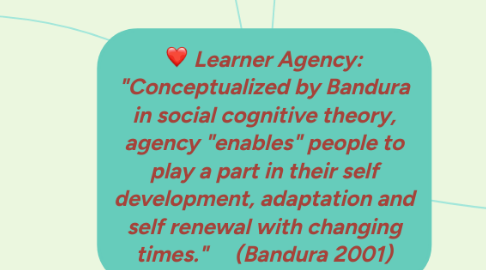Learner Agency: "Conceptualized by Bandura in social cognitive theory, agency "enables" people to play a part in their self development, adaptation and self renewal with changing times." (Bandura 2001)
by Jennifer Sexauer


1. Action I still plan to take:
1.1. I need to increase my use of flexible grouping and allowing more time to dialogue with the students regarding their math level and choice of learning group. In guided reading the students choose their texts for reinforcing their guided reading skills, but I need to spend more time learning why they chose the book and making sure they understand why they need to improve on the reading skill areas.
1.2. I need to build in even more time for reflection of work, learning, goal setting etc. I need to be deliberate about it or I need to really put this on the students to take ownership of carving out the time to reflect. I have felt like I need to be a part of this all the time, and that is not the case. Reflection should empower the students to want to do better or to be able to identify what they already do well.
1.3. We created the shared morning routines at the start of the year, I think we need to refresh and rethink some of them. I am noticing a lack of interest which tells me they have not owned it and therefore do not care. Implementing a problem solving meeting may increase the conversation and brainstorming that needs to happen.
2. Student Ownership
2.1. Making academic and personal choices that follow the essential agreements of the learning time
2.2. set goals and monitor those goals, explain the reasoning behind needing to have the goals
2.3. Students strengthen their self efficacy by working towards defining their voice in the classroom, and taking ownership in what THEY have to do to be successful.
3. Learning as a partnership
3.1. Students will learn by doing and it is important for the teachers to provide the opportunities for the "doing"
3.2. Teachers and students dialogue about the learning needs. Google Docs - create and edit documents online, for free.
3.3. The teacher learns what the students are capable of by trusting in the process and observing students in action. Allowing them to fail, struggle and make mistake will deepen the learning, but even more importantly deepen the relationship and partnership between the two parties.
4. Communication is KEY
4.1. Participation in the learning community communicates that a student understands their role and their impact on the school family.
4.2. Demonstrating and communicating preservernce, critical thinking and creativ thinking
4.3. Students being risk takers enough to question one another and to offer feedback to one another on their performance.
5. Ways I have worked to increase learner agency this school year:
5.1. Student created essential agreements for supplies, technology, use of classroom space etc.
5.2. Playlists for our literacy block for students to determine what learning path they will take each day.
5.2.1. Google Docs - create and edit documents online, for free.
5.3. Student created desk assignments and physcial arrangements
5.3.1. Bio
5.3.2. Handle
5.3.3. Website
5.4. Student led morning meeting and morning message creation Google Slides - create and edit presentations online, for free.
6. Self Efficacy
6.1. The teacher's ability to trust in the student's self efficacy emphasizes that they respect the students ideas.
6.2. ask questions, engage their brain in all learning tasks, even those that are not their passion
6.3. Students influence or direct their own learning by communicating their understanding and constructing new meaning
7. Ways that I see my work as a partnership with my students and increasing learner agency:
7.1. Students creating rubrics based on the assignments that the teacher gives out
7.2. Building questioning, teacher modeled, but student led in small groups, guided reading opportunities
7.3. Student created lines of inquiry and central idea signs with the class deciding how the questions will be presented and answered
7.4. All students have a daily job.
7.4.1. After pretests are given back, students highlight their strengths in their learning and then prioritize their learning plan of what they do not know. After deciding what they should learn first, they choose which learning group to join. This is very new and will need to be tweaked quite a bit, What I envisioned isn't working as well.

